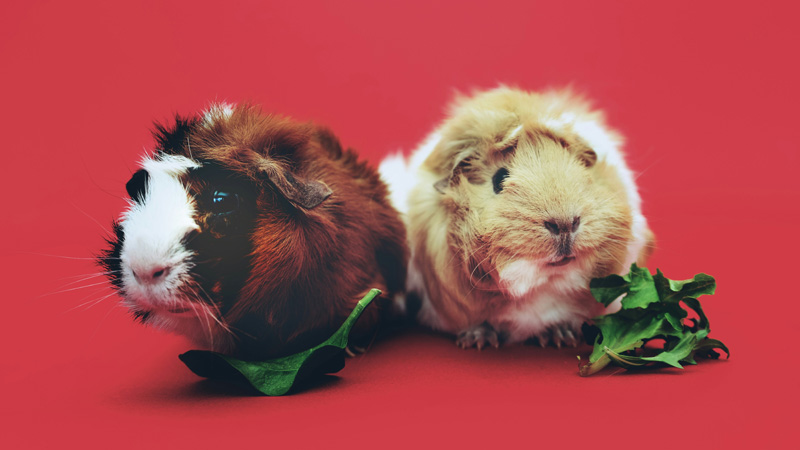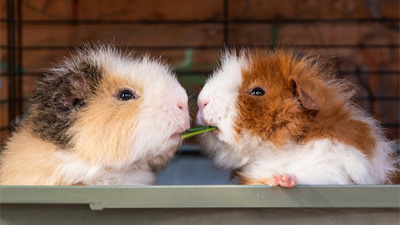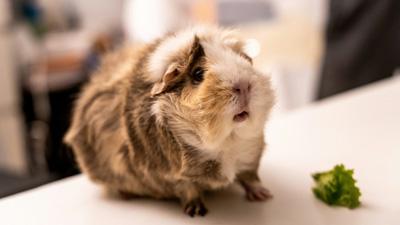What Can Guinea Pigs Eat? A Comprehensive Guide

Photo by Scott Webb on Unsplash
Guinea pigs, also known as cavies, are delightful small pets cherished for their gentle nature, charming personalities, and distinctive vocalizations. As herbivores, guinea pigs have specific dietary requirements essential for maintaining their health and well-being. Providing a balanced and nutritious diet is crucial for promoting optimal growth, digestion, and overall vitality in guinea pigs.
In this comprehensive guide, we'll explore what guinea pigs can eat, including hay, vegetables, fruits, pellets, and treats, as well as essential considerations for ensuring a healthy diet for your furry friend.
Hay: The Foundation of a Guinea Pig's Diet
Hay is the cornerstone of a guinea pig's diet and should make up the majority of their daily food intake. High-quality hay provides essential fiber, which is essential for maintaining healthy digestion and preventing gastrointestinal issues in guinea pigs. There are several types of hay suitable for guinea pigs, including:
Timothy Hay: Timothy hay is the most commonly recommended hay for guinea pigs. It is high in fiber, low in calcium, and promotes healthy digestion.
Orchard Grass: Orchard grass is another excellent option for guinea pigs. It has a similar nutritional profile to Timothy hay and provides variety in their diet.
Meadow Hay: Meadow hay is a blend of various grasses and herbs, providing additional texture and flavor to your guinea pig's diet.
Offer a constant supply of fresh hay to your guinea pig, ensuring they have access to it at all times. Hay should be clean, dry, and free from mold or dust. Providing hay in a hay rack or hay feeder can help keep it clean and prevent wastage.
Fresh Vegetables: Nutrient-Rich Additions to the Diet
In addition to hay, fresh vegetables are an essential component of a guinea pig's diet, providing essential vitamins, minerals, and antioxidants. When selecting vegetables for your guinea pig, choose a variety of options to ensure they receive a well-rounded diet. Some safe and nutritious vegetables for guinea pigs include:
Leafy Greens: Romaine lettuce, green leaf lettuce, red leaf lettuce, spinach, kale, arugula, and dandelion greens are excellent choices.
Bell Peppers: Red, green, and yellow bell peppers are rich in vitamin C and provide variety in flavor and texture.
Cucumber: Cucumber is hydrating and low in calories, making it a refreshing treat for guinea pigs.
Carrots: Carrots are a good source of beta-carotene and fiber, but should be fed in moderation due to their sugar content.
Broccoli: Broccoli is rich in vitamin C and fiber, but should be fed sparingly to avoid gas and bloating.
Celery: Celery is low in calories and provides hydration, but should be fed in moderation due to its high water content.
Introduce new vegetables gradually and observe your guinea pig's reaction. Some guinea pigs may have preferences or sensitivities to certain vegetables, so it's essential to offer a variety and monitor their intake.
Fresh Fruits: Occasional Treats for Variety and Flavor
Fresh fruits can be offered to guinea pigs as occasional treats, providing natural sweetness and additional nutrients. However, fruits should be fed in moderation due to their higher sugar content. Some safe and delicious fruits for guinea pigs include:
Apples: Remove seeds and core, and offer apple slices as a tasty treat.
Berries: Strawberries, blueberries, raspberries, and blackberries are rich in antioxidants and can be offered in small amounts.
Bananas: Banana slices are a favorite among many guinea pigs but should be fed sparingly due to their high sugar content.
Pears: Remove seeds and core, and offer pear slices as a refreshing snack.
Oranges: Offer small amounts of orange slices occasionally as a source of vitamin C, but avoid feeding citrus fruits in excess.
When offering fruits to your guinea pig, ensure they are fresh, ripe, and washed thoroughly to remove any pesticides or residues. Remove seeds, pits, and cores, as these can be choking hazards or contain toxins.
Commercial Pellets: Supplementary Nutrition
Commercial guinea pig pellets are formulated to provide essential nutrients, vitamins, and minerals that may be lacking in a guinea pig's diet. Pellets should be offered in moderation as a supplementary food source, alongside hay, vegetables, and fruits. Choose high-quality pellets specifically designed for guinea pigs, as they contain the appropriate balance of nutrients. Avoid pellets with added sugars, artificial colors, or fillers.
Offer a small amount of pellets daily, typically around 1/8 to 1/4 cup per adult guinea pig, depending on their size and activity level. Monitor your guinea pig's weight and adjust their pellet intake accordingly to prevent obesity and maintain a healthy body condition.
Water: Essential for Hydration
Fresh, clean water should be available to your guinea pig at all times. Provide water in a sipper bottle or water bowl, ensuring it is refreshed daily and free from contaminants. Guinea pigs are prone to dehydration, so it's essential to monitor their water intake and encourage them to drink regularly, especially during hot weather or illness.
Foods to Avoid
While guinea pigs have relatively simple dietary needs, there are some foods that should be avoided to prevent digestive upset, nutritional imbalances, or toxicity. Foods to avoid feeding to guinea pigs include:
High-Sugar Foods: Limit sugary treats such as candies, cookies, and sugary cereals, as they can lead to obesity and dental issues.
High-Fat Foods: Avoid fatty or oily foods such as fried snacks, processed meats, and fatty cuts of meat, as they can lead to obesity and digestive problems.
Dairy Products: Guinea pigs are lactose intolerant and should not be fed dairy products such as milk, cheese, or yogurt, as they can cause digestive upset.
Chocolate: Chocolate contains theobromine, which is toxic to guinea pigs and can cause serious health issues if ingested.
Avocado: Avocado contains persin, which is toxic to guinea pigs and can cause digestive upset, respiratory distress, and other health issues.
Onions and Garlic: Onions and garlic contain compounds that can be harmful to guinea pigs and may cause digestive upset or damage to red blood cells.
Transitioning to a New Diet
When introducing new foods to your guinea pig's diet, it's essential to do so gradually to avoid digestive upset or refusal to eat. Start by offering small amounts of new foods and monitor your guinea pig's reaction. If they tolerate the new food well, gradually increase the amount over several days until it becomes a regular part of their diet. If your guinea pig shows signs of digestive upset, such as diarrhea or bloating, discontinue the new food and consult your veterinarian.
Conclusion
In conclusion, guinea pigs have specific dietary requirements essential for maintaining their health and well-being. A balanced diet consisting of hay, fresh vegetables, fruits, pellets, and water is crucial for providing optimal nutrition and promoting longevity in guinea pigs. By offering a variety of nutritious foods, avoiding harmful or toxic substances, and monitoring your guinea pig's diet and health regularly, you can ensure they lead a happy, healthy, and fulfilling life as your beloved companion.
You May Also Like
 Guinea PigExploring the Most Popular Guinea Pig Breeds
Guinea PigExploring the Most Popular Guinea Pig Breeds Guinea PigExploring the Softest Guinea Pig Breeds
Guinea PigExploring the Softest Guinea Pig Breeds Guinea PigCan Guinea Pigs Eat Bananas? (Yes! Small Quantities)
Guinea PigCan Guinea Pigs Eat Bananas? (Yes! Small Quantities) Guinea PigCan Guinea Pigs Eat Spinach? (Yes! Small Quantities)
Guinea PigCan Guinea Pigs Eat Spinach? (Yes! Small Quantities) Guinea PigCan Guinea Pigs Eat Oranges?
Guinea PigCan Guinea Pigs Eat Oranges? Guinea PigCan Guinea Pigs Eat Celery? (Yes! Moderation)
Guinea PigCan Guinea Pigs Eat Celery? (Yes! Moderation)